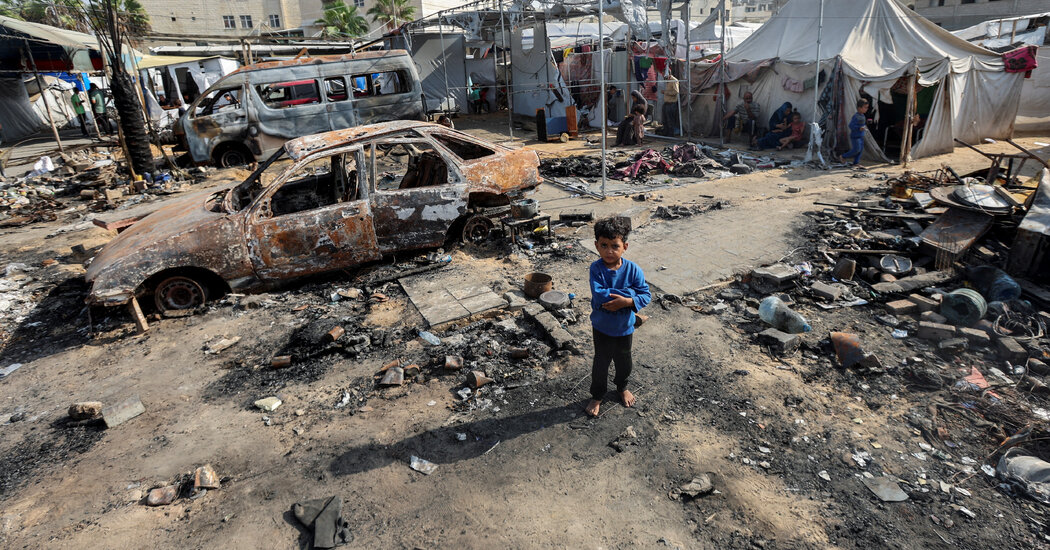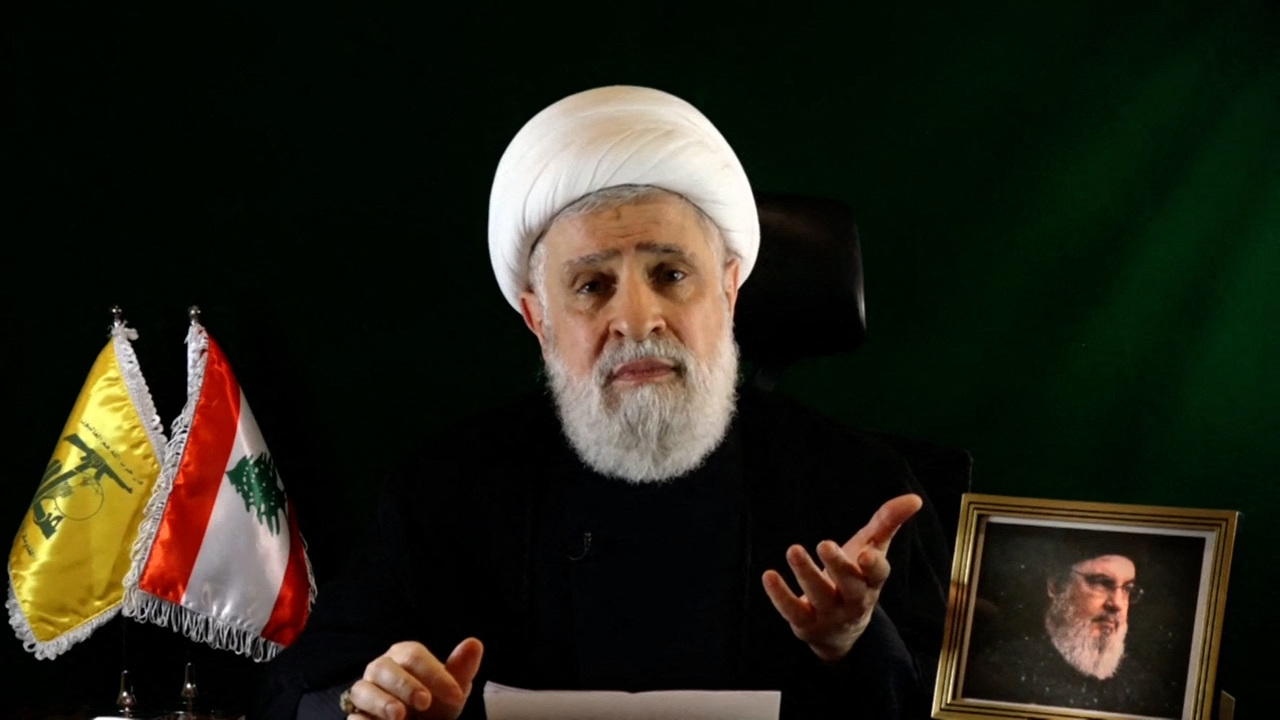FearlessRoar
T20I Star
- Joined
- Sep 11, 2023
- Runs
- 30,521
From UN peace keepers?Israel has the right to defend itself
Follow along with the video below to see how to install our site as a web app on your home screen.
Note: This feature may not be available in some browsers.
From UN peace keepers?Israel has the right to defend itself
Yes. They are fighting against UN peacekeepers. They should defend themselves. COWARDS THESE ISRAELIS areIsrael has the right to defend itself
You don’t condemn the UN? If you don’t condemn the UN then you support Hamas!From UN peace keepers?
UN Peace Keepers did not do a thing about Hezbollah taking over Lebanon and using Lebanese land to attack Israel.Fifth peacekeeper wounded in southern Lebanon, UN says
A UN peacekeeper has been wounded in southern Lebanon after being hit by gunfire, the UN Interim Force in Lebanon (Unifil) has said, the fifth member of the multinational force to be injured in recent days.
In a statement on Saturday, Unifil said the peacekeeper was injured at its headquarters in the southern city of Naquora on Friday night amid "ongoing military activity nearby", though added that it did not know the origin of the fire.
"He underwent surgery at our Naqoura hospital to remove the bullet and is currently stable," it said.
On Friday US President Joe Biden has said he was "absolutely, positively" urging Israel to stop firing at UN peacekeepers in Lebanon following two earlier incidents on Thursday and Friday.
Israeli troops have launched a ground invasion in southern Lebanon as part of its escalation against the Lebanese armed group Hezbollah, with which it has been trading cross-border fire on a near daily basis for the past year.
Israeli forces have urged UN peacekeepers to leave their positions. A spokesperson for Unifil said on Saturday that there had been a "unanimous decision" to stay in the border region.
Separately, Unifil said buildings at a position in the village of Ramyah sustained "significant damage due to explosions from nearby shelling" on Friday night.
"We remind all actors of their obligations to ensure the safety and security of UN personnel and premises, including avoiding combat activities near Unifil positions," the mission said.
On Friday, the Israel Defense Forces (IDF) acknowledged that its troops were responsible for an incident in which two Sri Lankan soldiers, also in Naqoura, were injured.
The IDF said soldiers operating near the base opened fire after identifying a threat and that the incident would be investigated "at the highest levels".
Sri Lanka's foreign ministry said it "strongly condemned" the attack.
On Thursday, two Indonesian peacekeepers were injured falling from an observation tower after Israeli tanks fired towards it.
Lt Gen Seán Clancy, chief of staff of the Irish Defence Forces, has said he does not believe the strike on Thursday was accidental. Some 340 Irish troops are currently operating in Lebanon with Unifil.
"An observer tower with a round from a tank directly into it, which is a very small target, has to be very deliberate," he told Irish broadcaster RTÉ.
"So from a military perspective, this is not an accidental act. It's a direct act.
"Whether its indiscipline or directed, either way it is not conscionable or allowable."
The leaders of France, Italy, and Spain have also condemned Israel's actions, saying in a joint statement that they were unjustifiable and should immediately end.
On Saturday Lebanon's health ministry said Israeli strikes on villages to the north and south of the capital Beirut had killed nine people.
The IDF also told residents of 23 southern Lebanese villages to evacuate to areas north of the Awali river.
Hezbollah continued to fire into Israel, with the IDF saying that about 320 projectiles had been identified and a number of them intercepted.
On Saturday, the IDF announced that the areas around the northern towns of Zar'it, Shomera, Shtula, Netu’a, and Eben Menachem would be closed to civilians from 20:00 local time (18:00 BST).
About 10,000 peacekeepers from 50 countries are stationed in Lebanon, alongside around 800 civilian staff.
Since 1978, they have patrolled the area between the Litani River and the UN-recognised boundary between Lebanon and Israel, known as the "Blue Line".
Hezbollah began firing rockets into northern Israel on 8 October last year, the day after Hamas's deadly attack on southern Israel. The Iran-backed group says it is acting in solidarity with the Palestinians and has said it will stop firing if there is a ceasefire between Israel and Hamas in Gaza.
Over the past three weeks, Israel has dramatically escalated its campaign against Hezbollah, intensifying air strikes against southern Lebanon and southern parts of Beirut, assassinating Hezbollah's leader Hassan Nasrallah and launching a ground invasion.
Lebanon says more than 2,000 people have been killed, mainly in the recent escalation, and hundreds of thousands have been displaced. This week Hezbollah rocket fire has killed two Israeli civilians and a Thai national, Israeli authorities say.
BBC

I am talking about Israel's attack on UN peacekeepersYou don’t condemn the UN? If you don’t condemn the UN then you support Hamas!
I am talking about Israel's attack on UN peacekeepers
I think you have missed all the sarcasm in my postsI am talking about Israel's attack on UN peacekeepers
@cricketjoshila are there any Indian troops stationed as part of UN peace keepers in Lebanon?
I hope they remain safeYes. Around 900.
I hope they remain safe
They are fulfilling a very important role and deserve respect.Depends. If they are Genuinely there for peacekeeping then yes. If not, they deserve what they get!
To be honest, they need to get out of the war zone. As per the BBC article, there are about 10,000 of them in position since 1978 trying to keep the peace. In the current scenario, there's no peace to be kept and they're in harms way. That's not what they signed up for.They are fulfilling a very important role and deserve respect.
However Netanyahu has no boundaries. Israelis deliberately attack international institutions to taunt the world. They have done so in the past.
That should be up to the UN and not Netanyahu and his thuggish tactics.To be honest, they need to get out of the war zone. As per the BBC article, there are about 10,000 of them in position since 1978 trying to keep the peace. In the current scenario, there's no peace to be kept and they're in harms way. That's not what they signed up for.
That's absolutely true but there's really no choice here. If Israel refuses to accept the sanctity of the Peacekeeping force, action needs to be taken against them by the UN (I'm not holding my breath).That should be up to the UN and not Netanyahu and his thuggish tactics.
You are right but If the UN pulls them it will lose the last shred of credibility it has left and render the whole concept of peacekeeping forces useless.That's absolutely true but there's really no choice here. If Israel refuses to accept the sanctity of the Peacekeeping force, action needs to be taken against them by the UN (I'm not holding my breath).
The peacekeepers who're from 50 countries, including some I suspect from Pakistan which like India been a big contributor of manpower to UN missions, are there as observers and cannot be expected to stay put under armed assault.
Well there has to be 'peace' for a peacekeeping force to keep. Both sides have to agree to a ceasefire/truce and accept the presence of the UN mission.You are right but If the UN pulls them it will lose the last shred of credibility it has left and render the whole concept of peacekeeping forces useless.
The Americans will have to get involved eventually to stop this.


Footage is here as well.Strike launched toward Israeli prime minister's house
Israel’s government said a drone was launched toward the the prime minister’s house Saturday, with no casualties.
Sirens wailed Saturday morning in Israel, warning of incoming fire from Lebanon, with a drone launched toward Israeli Prime Minister Benjamin Netanyahu’s house in Caesarea, the Israeli government said.
Neither he nor his wife were home and there were no casualties, said his spokesperson in a statement.
The strikes into Israel come as its war with Lebanon’s Hezbollah — a Hamas ally backed by Iran — has intensified in recent weeks.
Hezbollah said Friday that it planned to launch a new phase of fighting by sending more guided missiles and exploding drones into Israel. The militant group’s longtime leader, Hassan Nasrallah, was killed in an Israeli airstrike in late September, and Israel sent ground troops into Lebanon earlier in October.
A standoff is also ensuing between Israel and Hamas, which it’s fighting in Gaza, with both signaling resistance to ending the war after the death of Hamas’ leader Yahya Sinwar this week.
On Friday, Iran’s supreme leader, Ayatollah Ali Khamenei, said Sinwar’s death was a painful loss but noted that Hamas carried on despite the killings of other Palestinian militant leaders before him.
“Hamas is alive and will stay alive,” Khamenei said.
SOURCE: The Canadian Press
Its the israeli way..













Israel wants freedom to strike Lebanon even after ceasefire, France says
Israeli officials are insisting on maintaining a capacity to strike Lebanon at any moment as part of conditions to secure a ceasefire with Iran-backed Hezbollah, France's foreign minister said on Wednesday.
Speaking to a parliamentary hearing after holding talks in Israel last week in Jerusalem, Jean-Noel Barrot said it was a condition increasingly voiced among Israeli officials.
"Today we hear in Israel voices calling for it to keep a capacity to strike at any moment or even enter Lebanon, as is the case with its neighbour Syria," said Barrot, who held talks with Israeli Minister of Strategic Affairs Ron Dermer and new Defence Minister Israel Katz last week.
"That is not compatible with the sovereignty of a strong country," Barrot said, referring to broader efforts to help strengthen Lebanon's governance.
Several diplomats said that it would be all but impossible to get Hezbollah or Lebanon to accept any proposal that included this demand.
There was no immediate comment from Israel on the remarks. Its defence minister, Israel Katz, said earlier: "We will not allow any arrangement that does not include the achievement of the war's objectives - and above all Israel's right to enforce and act on its own against any terrorist activity."






